 Libri di Kertzer David I. su Unilibro.it) Libri di Kertzer David I. su Unilibro.it)
|
|
2023 |
 Title :
I papi contro gli ebrei. Il ruolo del Vaticano nell'ascesa dell'antisemitismo moderno
Title :
I papi contro gli ebrei. Il ruolo del Vaticano nell'ascesa dell'antisemitismo modernoAuthor: Kertzer David I. Publisher: Garzanti Esperto della storia italiana e in particolare del rapporto tra Chiesa cattolica ed ebraismo, neiPapi contro gli ebrei David Kertzer ricostruisce le responsabilità del Vaticano nella nascita e nella promozione dell'antisemitismo che ha portato alla Shoah. L'indagine prende avvio da una serie di documenti rimasti a lungo segreti e custoditi negli archivi centrali dell'Inquisizione: raccogliendone le rivelazioni, Kertzer ripercorre la storia della Chiesa dagli ultimi decenni dell'Ottocento fino all'inizio della seconda guerra mondiale e discute l'azione spesso ambigua dei papi, da Pio vii a Pio xii, nei confronti del popolo ebraico. Mettendo in luce come al radicamento di un generalizzato sentimento antigiudaico abbiano contribuito anche gli organi di comunicazione del Vaticano, tanto con le omissioni quanto con una propaganda che individuava negli ebrei elementi sospetti e in qualche modo colpevoli, Kertzer ci consegna in questo saggio ampiamente documentato la chiave per comprendere uno dei periodi più controversi e complessi del nostro passato. € 22,00
Scontato: € 20,90
|
 Title :
Un papa in guerra. La storia segreta di Mussolini, Hitler e Pio XII
Title :
Un papa in guerra. La storia segreta di Mussolini, Hitler e Pio XIIAuthor: Kertzer David I. Publisher: Garzanti Alla morte di Pio XII, nel 1958, tutti i documenti del pontificato furono rinchiusi negli archivi vaticani: impedendone la consultazione agli studiosi si sono così la sciati a lungo senza risposta interrogativi che nel tempo non hanno potuto che infittirsi, facendo di Eugenio Pacelli uno dei papi più controversi della storia. Nel 2020, dopo decenni di pressioni, quegli archivi sono stati finalmente aperti e il vincitore del Premio Pulitzer David Kertzer è stato tra i primi storici a potervi accedere. Il risultato è sorprendente. Con il supporto di migliaia di documenti inediti, Un papa in guerra rivela l'esistenza di negoziati segreti tra Hitler e Pio XII già a poche settimane dalla fine del conclave; racconta in che modo Mussolini abbia fatto affidamento sul clero italiano e sulle istituzioni religiose per ottenere l'appoggio popolare all'entrata in guerra; dimostra come tanto il Duce quanto il Führer siano riusciti a manipolare a proprio vantaggio il pontefice; e spiega perché, pur avendo prove inconfutabili dello sterminio in corso degli ebrei, Pio XII non abbia mai denunciato le atrocità naziste. David Kertzer getta nuova luce sul periodo più cupo della nostra storia e disegna il drammatico ritratto di un papa pronto a dismettere i panni di guida morale pur di preservare il millenario potere della Chiesa. € 20,00
Scontato: € 19,00
|
|
2022 |
 Title :
Un papa in guerra. La storia segreta di Mussolini, Hitler e Pio XII
Title :
Un papa in guerra. La storia segreta di Mussolini, Hitler e Pio XIIAuthor: Kertzer David I. Publisher: Garzanti Alla morte di Pio XII, nel 1958, tutti i documenti del pontificato furono rinchiusi negli archivi vaticani: impedendone la consultazione agli studiosi si sono così la sciati a lungo senza risposta interrogativi che nel tempo non hanno potuto che infittirsi, facendo di Eugenio Pacelli uno dei papi più controversi della storia. Nel 2020, dopo decenni di pressioni, quegli archivi sono stati finalmente aperti e il vincitore del Premio Pulitzer David Kertzer è stato tra i primi storici a potervi accedere. Il risultato è sorprendente. Con il supporto di migliaia di documenti inediti, Un papa in guerra rivela l'esistenza di negoziati segreti tra Hitler e Pio XII già a poche settimane dalla fine del conclave; racconta in che modo Mussolini abbia fatto affidamento sul clero italiano e sulle istituzioni religiose per ottenere l'appoggio popolare all'entrata in guerra; dimostra come tanto il Duce quanto il Führer siano riusciti a manipolare a proprio vantaggio il pontefice; e spiega perché, pur avendo prove inconfutabili dello sterminio in corso degli ebrei, Pio XII non abbia mai denunciato le atrocità naziste. David Kertzer getta nuova luce sul periodo più cupo della nostra storia e disegna il drammatico ritratto di un papa pronto a dismettere i panni di guida morale pur di preservare il millenario potere della Chiesa. € 28,00
Scontato: € 26,60
|
|
|
2021 |
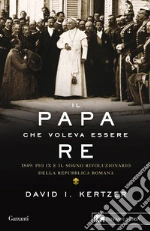 Title :
Il papa che voleva essere re. 1849: Pio IX e il sogno rivoluzionario della Repubblica romana
Title :
Il papa che voleva essere re. 1849: Pio IX e il sogno rivoluzionario della Repubblica romanaAuthor: Kertzer David I. Publisher: Garzanti Novembre, 1848. Pochi giorni dopo l'assassinio del suo primo ministro avvenuto nel cuore di Roma, papa Pio IX si ritrova prigioniero del suo stesso palazzo: l'onda rivoluzionaria che sta sconvolgendo l'Europa sembra poter mettere fine al potere temporale se non addirittura all'istituzione stessa del papato. Così, travestito da semplice parroco, Pio IX scappa da una porta secondaria e parte per l'esilio. Eppure, solamente due anni prima, la sua elezione aveva generato profondo ottimismo in tutta Italia: dopo il pontificato repressivo di Gregorio XVI il popolo guardava al nuovo, giovane e benevolo papa come all'uomo che avrebbe traghettato lo stato pontificio verso la modernità, persino favorendo la nascita di un'Italia unita. Dal desiderio di soddisfare i suoi sudditi e dalla paura, alimentata dai cardinali più conservatori, di provocare il crollo della Chiesa, scaturì un dramma fatto di intrighi politici, tradimenti, colpi di scena. David Kertzer porta in vita gli eccezionali protagonisti di queste vicende - Napoleone III, Garibaldi, Tocqueville, Metternich - e getta nuova luce sul declino del potere religioso in Occidente e sulla nascita della moderna Europa. € 18,00
Scontato: € 17,10
|
|
|
2019 |
 Title :
Nicholas Brown and the Roman Revolution of 1848-Nicholas Brown e la Rivoluzione Romana del 1848
Title :
Nicholas Brown and the Roman Revolution of 1848-Nicholas Brown e la Rivoluzione Romana del 1848Author: Kertzer David I. Publisher: Bononia University Press Come unico rappresentante ufficiale del Governo degli Stati Uniti a Roma al tempo della rivoluzione del 1848, Nicholas Brown giocò un ruolo importante, anche se poco noto, nelle vicende di quegli anni. Appellandosi ai valori repubblicani e illuministi, sostenne infatti attivamente la Repubblica Romana appena proclamata, in conflitto diretto con le istruzioni ricevute dal segretario di Stato del suo stesso Governo. Il suo carteggio con Giuseppe Mazzini e altre figure di spicco nel dramma che si consumò tra il 1848 e il 1849, rimasto a lungo sepolto oltreoceano negli archivi della Brown University, offre quindi una nuova prospettiva su un episodio fondamentale del Risorgimento italiano. € 14,00
|
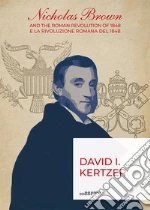 Title :
Nicholas Brown and the Roman Revolution of 1848-Nicholas Brown e la Rivoluzione Romana del 1848. Ediz. bilingue
Title :
Nicholas Brown and the Roman Revolution of 1848-Nicholas Brown e la Rivoluzione Romana del 1848. Ediz. bilingueAuthor: Kertzer David I. Publisher: 1088 Press Unico rappresentante ufficiale del Governo degli Stati Uniti a Roma, durante la Rivoluzione del 1848, Nicholas Brown giocò un ruolo importante, anche se poco noto, nelle vicende di quegli anni. Appellandosi ai valori repubblicani e illuministi, sostenne attivamente la Repubblica Romana appena proclamata, in conflitto diretto con le istruzioni ricevute dal segretario di Stato del suo stesso Governo. Il suo carteggio con Mazzini, Armellini e Saffi e con altri protagonisti delle vicende romane tra il 1848 e il 1849, rimasto a lungo sepolto oltreoceano negli archivi della Brown University, offre quindi una nuova prospettiva su un episodio fondamentale del Risorgimento italiano. Il volume comprende le immagini di una selezione di documenti dal Fondo Nicholas Brown, John Hay Library, Brown University. € 14,00
|
 Title :
Il papa che voleva essere re. 1849: Pio IX e il sogno rivoluzionario della Repubblica romana
Title :
Il papa che voleva essere re. 1849: Pio IX e il sogno rivoluzionario della Repubblica romanaAuthor: Kertzer David I. Publisher: Garzanti Novembre, 1848. Pochi giorni dopo l'assassinio del suo primo ministro avvenuto nel cuore di Roma, papa Pio IX si ritrova prigioniero del suo stesso palazzo: l'onda rivoluzionaria che sta sconvolgendo l'Europa sembra poter mettere fine al potere temporale se non addirittura all'istituzione stessa del papato. Così, travestito da semplice parroco, Pio IX scappa da una porta secondaria e parte per l'esilio. Eppure, solamente due anni prima, la sua elezione aveva generato profondo ottimismo in tutta Italia: dopo il pontificato repressivo di Gregorio XVI il popolo guardava al nuovo, giovane e benevolo papa come all'uomo che avrebbe traghettato lo stato pontificio verso la modernità, persino favorendo la nascita di un'Italia unita. Dal desiderio di soddisfare i suoi sudditi e dalla paura, alimentata dai cardinali più conservatori, di provocare il crollo della Chiesa, scaturì un dramma fatto di intrighi politici, tradimenti, colpi di scena. David Kertzer porta in vita gli eccezionali protagonisti di queste vicende - Napoleone III, Garibaldi, Tocqueville, Metternich - e getta nuova luce sul declino del potere religioso in Occidente e sulla nascita della moderna Europa. € 25,00
Scontato: € 23,75
|
|
1918 |
 Title :
The Italian Executioners
Title :
The Italian ExecutionersAuthor: Sullam Simon Levis, Smyth Oona (TRN), Patane Claudia (TRN), Kertzer David I. (FRW) Publisher: Princeton Univ Pr € 24,10
|
 Title :
Aging in the Past
Title :
Aging in the PastAuthor: Kertzer David I. (EDT), Laslett Peter (EDT) Publisher: Univ of California Pr € 55,00
|
 Title :
The Pope Who Would Be King
Title :
The Pope Who Would Be KingAuthor: Kertzer David I. Publisher: Random House Inc € 33,50
|
|
1915 |
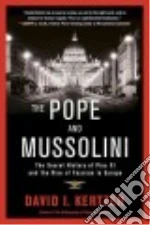 Title :
The Pope and Mussolini
Title :
The Pope and MussoliniAuthor: Kertzer David I. Publisher: Random House Inc NAMED ONE OF THE BEST BOOKS OF THE YEAR BY SAN FRANCISCO CHRONICLE From National Book Award finalist David I. Kertzer comes the gripping story of Pope Pius XI’s secret relations with Italian dictator Benito Mussolini. This groundbreaking work, based on seven years of research in the Vatican and Fascist archives, including reports from Mussolini’s spies inside the highest levels of the Church, will forever change our understanding of the Vatican’s role in the rise of Fascism in Europe. The Pope and Mussolini tells the story of two men who came to power in 1922, and together changed the course of twentieth-century history. In most respects, they could not have been more different. One was scholarly and devout, the other thuggish and profane. Yet Pius XI and “Il Duce” had many things in common. They shared a distrust of democracy and a visceral hatred of Communism. Both were prone to sudden fits of temper and were fiercely protective of the prerogatives of their office. (“We have many interests to protect,” the Pope declared, soon after Mussolini seized control of the government in 1922.) Each relied on the other to consolidate his power and achieve his political goals. In a challenge to the conventional history of this period, in which a heroic Church does battle with the Fascist regime, Kertzer shows how Pius XI played a crucial role in making Mussolini’s dictatorship possible and keeping him in power. In exchange for Vatican support, Mussolini restored many of the privileges the Church had lost and gave in to the pope’s demands that the police enforce Catholic morality. Yet in the last years of his life—as the Italian dictator grew ever closer to Hitler—the pontiff’s faith in this treacherous bargain started to waver. With his health failing, he began to lash out at the Duce and threatened to denounce Mussolini’s anti-Semitic racial laws before it was too late. Horrified by the threat to the Church-Fascist alliance, the Vatican’s inner circle, including the future Pope Pius XII, struggled to restrain the headstrong pope from destroying a partnership that had served both the Church and the dictator for many years. The Pope and Mussolini brims with memorable portraits of the men who helped enable the reign of Fascism in Italy: Father Pietro Tacchi Venturi, Pius’s personal emissary to the dictator, a wily anti-Semite known as Mussolini’s Rasputin; Victor Emmanuel III, the king of Italy, an object of widespread derision who lacked the stature—literally and figuratively—to stand up to the domineering Duce; and Cardinal Secretary of State Eugenio Pacelli, whose political skills and ambition made him Mussolini’s most powerful ally inside the Vatican, and positioned him to succeed the pontiff as the controversial Pius XII, whose actions during World War II would be subject for debate for decades to come. With the recent opening of the Vatican archives covering Pius XI’s papacy, the full story of the Pope’s complex relationship with his Fascist partner can finally be told. Vivid, dramatic, with surprises at every turn,The Pope and Mussolini is history writ large and with the lightning hand of truth. Praise for The Pope and Mussolini “Kertzer has an eye for a story, an ear for the right word, and an instinct for human tragedy. This is a sophisticated blockbuster.”—Joseph J. Ellis, Pulitzer Prize–winning author ofRevolutionary Summer “A fascinating and tragic story.”—The New Yorker From the Hardcover edition. € 17,90
|
|
|
1914 |
 Title :
The Pope and Mussolini
Title :
The Pope and MussoliniAuthor: Kertzer David I. Publisher: Random House Inc From National Book Award finalist David I. Kertzer comes the gripping story of Pope Pius XI’s secret relations with Italian dictator Benito Mussolini. This groundbreaking work, based on seven years of research in the Vatican and Fascist archives, including reports from Mussolini’s spies inside the highest levels of the Church, will forever change our understanding of the Vatican’s role in the rise of Fascism in Europe. The Pope and Mussolini tells the story of two men who came to power in 1922, and together changed the course of twentieth-century history. In most respects, they could not have been more different. One was scholarly and devout, the other thuggish and profane. Yet Pius XI and “Il Duce” had many things in common. They shared a distrust of democracy and a visceral hatred of Communism. Both were prone to sudden fits of temper and were fiercely protective of the prerogatives of their office. (“We have many interests to protect,” the Pope declared, soon after Mussolini seized control of the government in 1922.) Each relied on the other to consolidate his power and achieve his political goals. In a challenge to the conventional history of this period, in which a heroic Church does battle with the Fascist regime, Kertzer shows how Pius XI played a crucial role in making Mussolini’s dictatorship possible and keeping him in power. In exchange for Vatican support, Mussolini restored many of the privileges the Church had lost and gave in to the pope’s demands that the police enforce Catholic morality. Yet in the last years of his life—as the Italian dictator grew ever closer to Hitler—the pontiff’s faith in this treacherous bargain started to waver. With his health failing, he began to lash out at the Duce and threatened to denounce Mussolini’s anti-Semitic racial laws before it was too late. Horrified by the threat to the Church-Fascist alliance, the Vatican’s inner circle, including the future Pope Pius XII, struggled to restrain the headstrong pope from destroying a partnership that had served both the Church and the dictator for many years. The Pope and Mussolini brims with memorable portraits of the men who helped enable the reign of Fascism in Italy: Father Pietro Tacchi Venturi, Pius’s personal emissary to the dictator, a wily anti-Semite known as Mussolini’s Rasputin; Victor Emmanuel III, the king of Italy, an object of widespread derision who lacked the stature—literally and figuratively—to stand up to the domineering Duce; and Cardinal Secretary of State Eugenio Pacelli, whose political skills and ambition made him Mussolini’s most powerful ally inside the Vatican, and positioned him to succeed the pontiff as the controversial Pius XII, whose actions during World War II would be subject for debate for decades to come. With the recent opening of the Vatican archives covering Pius XI’s papacy, the full story of the Pope’s complex relationship with his Fascist partner can finally be told. Vivid, dramatic, with surprises at every turn, The Pope and Mussolini is history writ with flair and the lightning hand of truth. Advance praise for The Pope and Mussolini “David Kertzer has an eye for a story, an ear for the right word, and an instinct for human tragedy. They all come together in The Pope and Mussolini to document, with meticulous scholarship and novelistic flair, the complicity between Pius XI and the Fascist leader in creating an unholy alliance between the Vatican and a totalitarian government rooted in corruption and brutality. This is a sophisticated blockbuster.”—Joseph J. Ellis, Pulitzer Prize–winning author of Revolutionary Summer € 32,00
|
|
|
2014 |
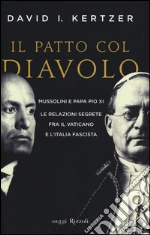 Title :
Il patto col diavolo. Mussolini e papa Pio XI. Le relazioni segrete fra il Vaticano e l'Italia fascista
Title :
Il patto col diavolo. Mussolini e papa Pio XI. Le relazioni segrete fra il Vaticano e l'Italia fascistaAuthor: Kertzer David I. Publisher: Rizzoli I rapporti tra il Vaticano e il fascismo sono da sempre oggetto di controversia. Da una parte quanti sostengono che la Chiesa sia stata una ferma oppositrice del Duce, dall'altra quanti ritengono che invece lo abbia appoggiato in materia determinante. Dopo l'apertura, nel 2006, degli Archivi vaticani, nuovi documenti permettono di approfondire il dipanarsi delle relazioni tra Pio XI e Benito Mussolini. Spie, traditori, carte segrete e scandali taciuti rivelano una storia di opportunismi, di interessi talvolta convergenti - a partire dalla comune lotta contro il comunismo - ma anche di riluttanze, insofferenze e duelli all'arma bianca. Mussolini aveva bisogno del Papa per far dimenticare il proprio passato anticlericale e guadagnare il consenso in un Paese cattolico, il Papa, per parte sua, intendeva restaurare i privilegi perduti del clero e cullava il sogno di uno Stato confessionale. Ma con lo stringersi dell'alleanza tra Mussolini e Hitler, le perplessità di Pio XI si faranno sempre più serie e la sua disponibilità verso il regime vacillerà ogni giorno di più. La visita trionfale del Führer a Roma e le successive esternazioni del Duce sulla superiorità e la purezza della razza italiana lo fecero inorridire. Allora decise di scrivere un discorso, per denunciare l'intollerabile abbraccio del razzismo nazista: avrebbe dovuto tenerlo a tutti i vescovi d'Italia l'11 febbraio 1939, ma il giorno prima morirà e tutte le copie di quel discorso saranno fatte scomparire. € 24,00
Scontato: € 22,80
|
|
|
2010 |
 Title :
La sfida di Amalia. La lotta per la giustizia di una donna nella Bologna dell'Ottocento
Title :
La sfida di Amalia. La lotta per la giustizia di una donna nella Bologna dell'OttocentoAuthor: Kertzer David I. Publisher: Rizzoli Bologna 1886. Amalia Bagnacavalli è una giovane contadina nata e cresciuta a Vergato, un paesino dell'Appennino che da secoli vive di poca agricoltura e molti sacrifici. Per far fronte alle ristrettezze in cui versa la famiglia, decide di prendere a balia un orfanello dall'Ospedale degli esposti. Ma il viaggio nella città, ancora gravata da un retaggio medievale, segna l'inizio delle sue vicissitudini: dalla bambina che le assegnano - sguardo opaco, petto scavato e corpicino deforme - contrae la sifilide, della quale faranno le spese anche il marito e la figlia. Invece di rassegnarsi all'ingiustizia, Amalia si rivolge ad Augusto Barbieri, un giovane e ambizioso avvocato, che accetta di intentare causa al potentissimo corpo amministrativo centrale degli ospedali di Bologna e al suo presidente, il conte Isolani. Un'avventura più pericolosa di quanto una popolana analfabeta possa immaginare, che la porterà a fare i conti con un mondo più grande di lei e con la disonestà degli uomini, mentre la malattia divora il suo corpo e la sua famiglia. Frutto di un paziente lavoro di scavo negli archivi e di una felice vena narrativa, 'La sfida di Amalia' ricostruisce con rigore e partecipazione le vicende dei protagonisti e il lungo iter processuale, riportando alla luce una storia sorprendentemente attuale. Che vede Amalia, eroina moderna, sovvertire la condanna atavica alla sopportazione e dare voce a quell'oppresso e povero mondo delle campagne che si lancia all'attacco dell'antica aristocrazia. € 19,00
Scontato: € 18,05
|
|
|
2006 |
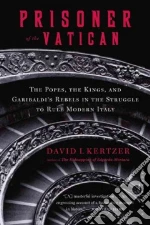 Title :
Prisoner of the Vatican
Title :
Prisoner of the VaticanAuthor: Kertzer David I. Publisher: Lightning Source Inc Praise for David Kertzer and Prisoner of the Vatican: 'Kertzer once again proves himself a truly compelling historian.' -- André Aciman 'Prisoner of the Vatican reads like exciting fiction. And it has astounding contemporary relevance.' -- Alfred Uhry 'Kertzer's careful scholarship and lucid writing make the human character of this religious institution quite clear.' -- James Carroll 'Fascinating.' -- Entertainment Weekly 'Lively . . . filled with telling anecdotes and colorful descriptions of the various characters involved in the struggle.' -- America, the National Catholic Weekly 'Riveting and fast-paced . . . history writing at its best.' -- Publishers Weekly, starred review '[A] rousing tale . . . from a masterful, controversial scholar.' -- Kirkus Reviews, starred review 'A chilling and timely warning of what happens when religious power becomes synonymous with political power. If you love Italy, if you love Rome, this book is essential reading.' -- John Guare 'As magically spellbinding as it is enlightening, replete with colorful characters and complex international and ecclesiastical politics and intrigue. Kertzer is a national treasure and his latest book another masterpiece.' -- Kevin Madigan, associate professor, Harvard Divinity School 'This book is a gift to everyone who welcomes the emergence of buried history, and a boon to anyone who has ever wondered about the origins of the wonderful, tenuously unified place called modern Italy.' -- Tracy Kidder David Kertzer's absorbing history presents an astonishing account of the birth of modern Italy and the clandestine politics behind the Vatican's last stand in the battle between church and the newly created Italian state. Drawing on a wealth of secret documents long buried in the Vatican archives, Kertzer reveals a fascinating story of outrageous accusations, mutual denunciations, raucous demonstrations, and secret dealings. When Italy's armies seized the Holy City and claimed it for the Italian capital, Pope Pius IX, outraged, retreated to the Vatican and declared himself a prisoner, calling on foreign powers to force the Italians out of Rome. The action set in motion decades of political intrigues that hinged on such fascinating characters as Garibaldi, King Viktor Emmanuel, Napoleon III, and Chancellor Bismarck. No one who reads this eye-opening book will ever think of Italy, or the Vatican, in quite the same way again. 'A gripping account of this little-known story.' -- Washington Post ?A suspenseful and even captivating read . . . Kertzer illuminates one of history's darker corners.” -- Providence Journal 'Extraordinary . . . Kertzer describes intrigue, spying, disinformation, and public relations campaigns worthy of any contemporary spy novel.' -- Seattle Times David I. Kertzer is author of several illuminating works of history, including The Popes Against the Jews and The Kidnapping of Edgardo Mortara, a National Book Award finalist. A professor of anthropology and Italian studies at Brown University, he lives in Providence, Rhode Island. € 21,10
|
|
|
2005 |
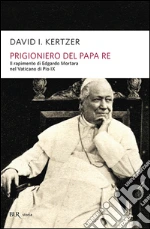 Title :
Prigioniero del papa re
Title :
Prigioniero del papa reAuthor: Kertzer David I. Publisher: Rizzoli La sera del 23 giugno 1858 a Bologna la polizia bussò alla porta della casa di Momolo Mortara, rispettato mercante ebreo. Lo scopo: farsi consegnare il figlio Edgardo di sei anni. Il motivo: all'Inquisitore di Bologna risultava che il bambino fosse stato segretamente battezzato e la legge dello Stato pontificio non tollerava che un bambino cristiano crescesse all'interno di una famiglia ebrea. Tra le proteste della famiglia, Edgardo iniziò un lungo viaggio verso Roma per diventare un buon cattolico. Ma la vicenda (e il suo seguito) non riguardò solo la famiglia Mortara. Mobilitò l'opinione pubblica liberale, indignò le comunità ebrariche, provocò l'entrata in scena del papa Pio IX stesso e finì per influenzare addirittura la storia d'Italia... € 11,00
Scontato: € 10,45
|
|
|
2002 |
 Title :
The Popes Against the Jews
Title :
The Popes Against the JewsAuthor: Kertzer David I. Publisher: Vintage Books In this meticulously researched, unflinching, and reasoned study, National Book Award finalist David I. Kertzer presents shocking revelations about the role played by the Vatican in the development of modern anti-Semitism. Working in long-sealed Vatican archives, Kertzer unearths startling evidence to undermine the Church's argument that it played no direct role in the spread of modern anti-Semitism. In doing so, he challenges the Vatican's recent official statement on the subject, We Remember. Kertzer tells an unsettling story that has stirred up controversy around the world and sheds a much-needed light on the past. € 16,10
|
|
|
1998 |
 Title :
The Kidnapping of Edgardo Mortara
Title :
The Kidnapping of Edgardo MortaraAuthor: Kertzer David I. Publisher: Vintage Books National Book Award Finalist Bologna: nightfall, June 1858. A knock sounds at the door of the Jewish merchant Momolo Mortara. Two officers of the Inquisition bust inside and seize Mortara's six-year-old son, Edgardo. As the boy is wrenched from his father's arms, his mother collapses. The reason for his abduction: the boy had been secretly 'baptized' by a family servant. According to papal law, the child is therefore a Catholic who can be taken from his family and delivered to a special monastery where his conversion will be completed. With this terrifying scene, prize-winning historian David I. Kertzer begins the true story of how one boy's kidnapping became a pivotal event in the collapse of the Vatican as a secular power. The book evokes the anguish of a modest merchant's family, the rhythms of daily life in a Jewish ghetto, and also explores, through the revolutionary campaigns of Mazzini and Garibaldi and such personages as Napoleon III, the emergence of Italy as a modern national state. Moving and informative, the Kidnapping of Edgardo Mortara reads as both a historical thriller and an authoritative analysis of how a single human tragedy changed the course of history. € 15,20
|
|
|
1989 |
 Title :
Riti e simboli del potere
Title :
Riti e simboli del potereAuthor: Kertzer David I. Publisher: Laterza € 14,98
|